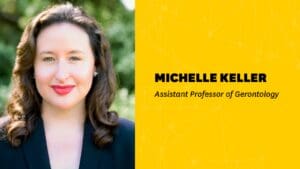The San Jose Mercury News quoted Berenice Benayoun of the USC Leonard Davis School on how individual immune cells age and the impact of an individual’s environment on the aging process.
Business Insider noted research by Valter Longo of the USC Leonard Davis School to develop a meal kit to guide individuals through intermittent fasting.
McKnight’s Long-Term Care News featured a study led by Anna Rahman and Susan Enguidanos of the USC Leonard Davis School on how social media users who rate nursing homes often do so using more service-oriented criteria than government officials. The study compared Yelp reviews of nursing homes against their Nursing Home Compare rankings.
Romper cited comments by Christian Pike of the USC Leonard Davis School on how males and females experience Alzheimer’s disease differently.
Bloomberg mentioned research by Valter Longo of the USC Leonard Davis School on the health benefits of intermittent-fasting diets.
U.S. News & World Report highlighted research by Valter Longo of the USC Leonard Davis School that suggests chemotherapy might be more effective if the patient practices a fasting-mimicking diet. “The cancer cells are usually dependent on much more glucose than [normal cells], [so] by decreasing the glucose [present in the body] you can generate problems” for the cancer cells, Longo said. According to Longo, the same principles could apply to treating a variety of human diseases.
Newsweek featured research by Eileen Crimmins of the USC Leonard Davis School that found college-educated Americans live longer without dementia and Alzheimer’s disease. The researchers found a college education was a strong indicator of more years spent with a healthy mind. “This association between the increase in college attainment and the decline in dementia prevalence is good news for people who have completed some higher education or earned a degree, but what does it mean for people who are less educated? They are more likely to develop dementia, and live longer with it,” Crimmins said.
The Wall Street Journal published commentary by Paul Irving of the USC Leonard Davis School about the rise of loneliness for older adults and how it is a growing public health issue. “By recognizing the magnitude of the loneliness epidemic, confronting the realities and developing solutions, we can improve lives, communities and businesses. Instead of songs of loneliness, we’ll be humming a different tune, something like the Beatles lyrics, ‘I get by with a little help from my friends,'” Irving wrote.
Inside Higher Ed featured two research studies by Eileen Crimmins of the USC Davis School and Julie Zissimopoulos of the USC Schaeffer Center – who worked on the second study with Crimmins – that found college-educated Americans live longer without dementia and Alzheimer’s disease, and how chronic disease impacts the onset of dementia-related conditions. Crimmins’ first study found a college education was a strong indicator of more years spent with a healthy mind. Zissimopoulos and Crimmins found that reducing cases of chronic disease, like hypertension and diabetes, did improve health and life expectancy, but increased the number of years spent with dementia.
Marketwatch quoted Jennifer Ailshire of the USC Leonard Davis School on how different genders define self-worth during aging.






